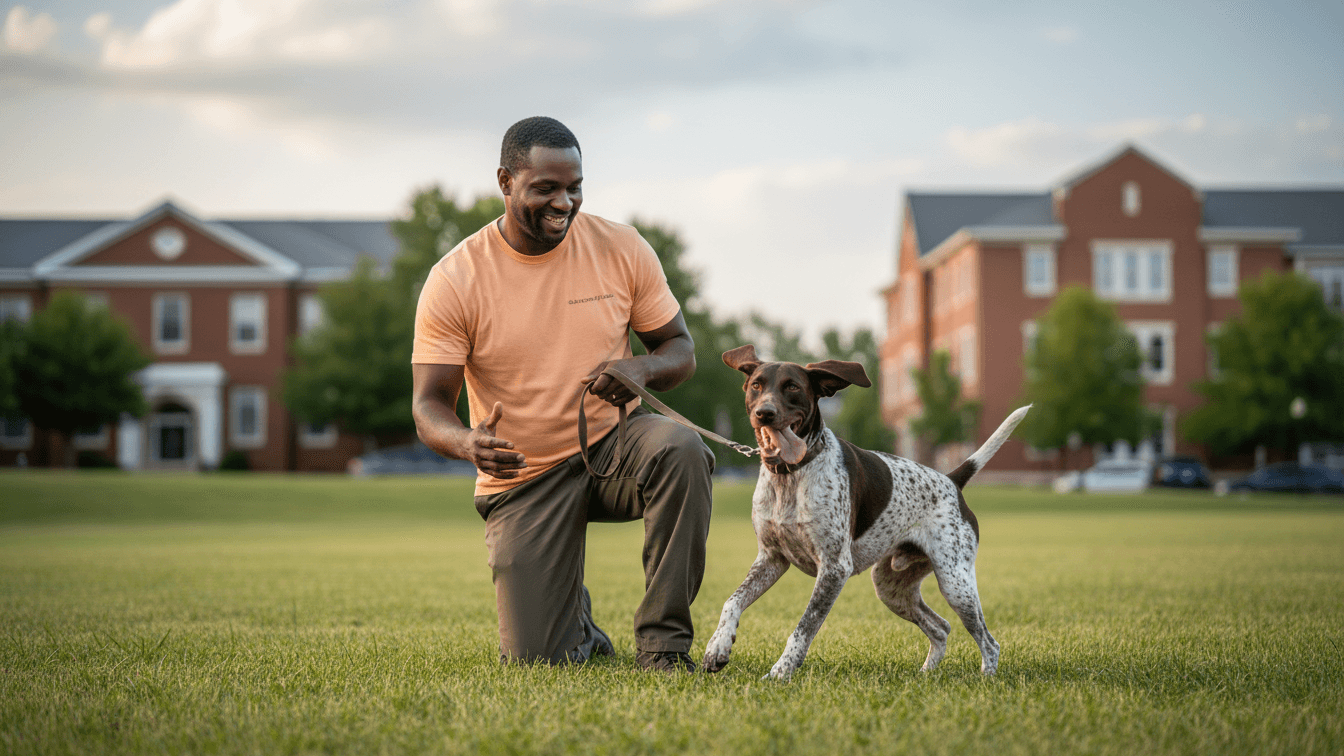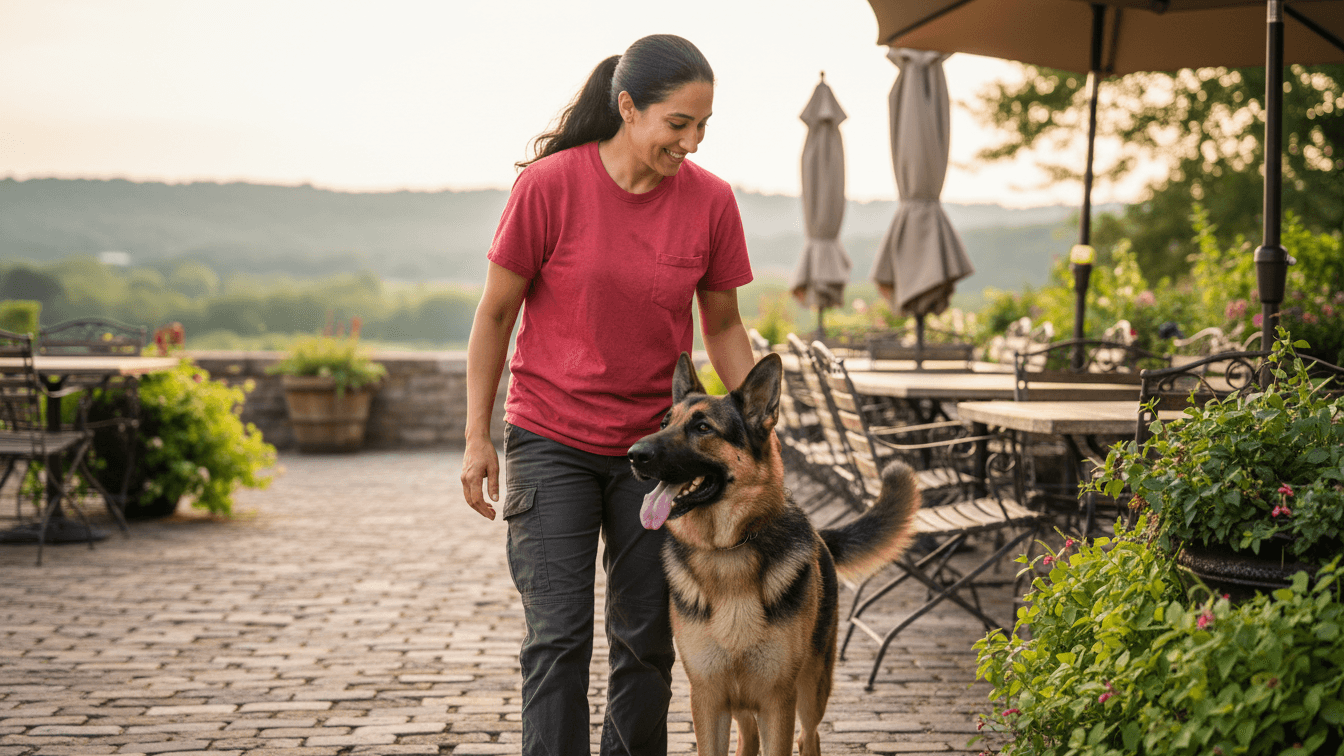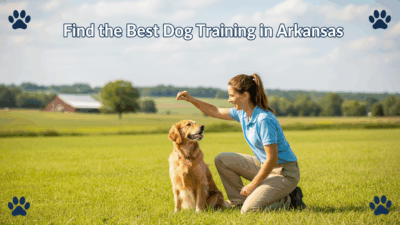Your Complete Guide to Choosing a Dog Trainer in Arkansas and Surrounding Areas
Finding a professional dog trainer in Arkansas means looking for someone who understands the challenges of living with dogs in The Natural State. Whether you’re navigating busy trails at one of Arkansas’s many state parks, dealing with wildlife distractions on rural properties, or working on basic obedience for apartment living in Little Rock or Fayetteville, the right training program makes all the difference.
Arkansas doesn’t have statewide licensing requirements for dog trainers, so it’s up to you to verify credentials and methods before signing up. Look for trainers who use positive reinforcement training and can adapt their approach to your specific goals, whether that’s puppy training, reactivity work, or preparing your dog for public spaces.
How to Choose the Right Trainer
Start by finding someone who emphasizes science-based, reward-focused methods and has clear experience with the challenges Arkansas dog owners face. Your dog needs to handle everything from hot summers on outdoor patios to crowded farmers markets and encounters with local wildlife like deer, squirrels, and even the occasional armadillo.
Check for dog trainer certifications like CPDT-KA, KPA-CTP, or IAABC-CDBC if your dog has behavior problems. For serious aggression or fear issues, look for advanced credentials like CBCC-KA or specialized behavior programs such as CTC.
In-home dog training works great for puppies, household manners, and neighborhood leash skills. Group classes make sense once your dog can focus around other dogs, and they provide valuable socialization practice in a controlled setting.
Board and train programs can accelerate progress when you’re short on time, but make sure the trainer uses humane methods and includes thorough handoff sessions so you can maintain the skills at home.
Common Dog Training Methods Explained

Reward-based methods build trust while creating lasting behavior changes that stick even when distractions increase. They also help you stay compliant with local leash laws and animal control ordinances across Arkansas counties.
Basic obedience covers sit, down, stay, place, recall, and leash training so your dog can handle everyday situations without pulling, jumping, or ignoring you. These skills matter whether you’re hiking at Devil’s Den or walking downtown Bentonville.
Puppy classes focus on socialization, potty training, bite inhibition, crate comfort, and early leash manners. Starting early prevents bad habits from taking root during those crucial first months.
Behavior modification addresses fear, reactivity, resource guarding, or separation anxiety through careful desensitization and counterconditioning. For complex cases, ask whether your trainer collaborates with veterinarians or veterinary behaviorists.
Private lessons let you customize everything around your daily routines and specific challenges. Day training can speed up results when you need faster progress but can’t commit to multiple sessions per week.
Dog training classes help your dog practice good manners around other dogs and people in a structured environment. The best classes screen participants carefully, give dogs plenty of space, and teach calm behavior rather than overexcitement.
Service dog training and therapy dog training require extra structure, public-access skills, and a step-by-step program that meets specific legal and organizational standards.
Avoid trainers who rely on fear, intimidation, or pain to get results. Humane methods are safer, more effective long-term, and better for maintaining a trusting relationship with your dog.
Average Cost of Dog Training in Arkansas (Updated for 2025)
Prices across Arkansas vary depending on the trainer’s experience, session length, and whether services happen at your home or a training facility. Here’s what most Arkansas dog owners are paying in 2025.
| Service Type | Average Cost (Arkansas) |
|---|---|
| Puppy classes (4-6 weeks) | $120-$250 total |
| Group obedience classes (4-6 weeks) | $140-$280 total |
| Private lessons (60-90 min) | $95-$175 per session |
| In-home training packages (4-6 visits) | $375-$850 total |
| Day training (trainer works your dog + handoff) | $400-$900 per week |
| Behavior consult for reactivity/anxiety (initial) | $135-$225 |
| Board and train (2-4 weeks) | $1,800-$4,200 total |
Expect to pay more in larger cities like Little Rock, Fayetteville, and Rogers compared to rural areas. Travel fees may apply for trainers covering multiple counties or remote locations.
Make sure you understand what’s included in the total cost, how progress gets tracked, and whether the trainer offers a free consultation or free evaluation before you commit.
Questions to Ask a Potential Dog Trainer
- What training methods do you use, and how do you keep training sessions positive and low-stress?
- What credentials or certifications do you hold, and do you pursue continuing education such as CPDT-KSA?
- How will you customize the training program for my dog’s specific needs and our Arkansas lifestyle?
- Do you offer in-home sessions, group classes, or day training, and which approach fits my goals best?
- How will we measure my dog’s progress and know when to add more distractions or difficulty?
- What are the total costs, including any travel fees, and what’s your cancellation policy?
- Do you carry liability insurance, and can you provide proof?
- For behavior problems, will you work with my veterinarian if needed?
- What should I practice between our sessions to help my dog keep improving?
- Can you provide references from other clients with similar challenges?
Local Arkansas Rules and Considerations for Dog Owners
Arkansas counties and municipalities enforce their own leash laws, noise ordinances, and animal control regulations. Most cities require dogs to be leashed in public spaces, though specific rules vary by location.
Leash laws are common across Arkansas cities and towns. Check with your local city hall or county government for specific rules about leash length and where dogs are allowed off-leash.
Arkansas requires current rabies vaccination for all dogs over three months old under state law. Your veterinarian must provide a rabies certificate and tag, which your dog should wear at all times. Find more information through the Arkansas Department of Health.
Excessive barking can lead to nuisance complaints in most Arkansas municipalities. Work with your trainer on alert barking and separation anxiety before neighbors file complaints with animal control.
Some Arkansas cities require pet licenses or registration. Check with your local city or county government to understand specific requirements where you live.
Arkansas doesn’t require special licenses for dog trainers, but if a trainer operates a boarding facility as part of board and train services, they may need to follow local business regulations and health department guidelines.
Commercial dog training services in public parks may require permits or proof of liability insurance. Trainers should verify rules with local parks departments before conducting group classes or private lessons in public spaces.
Local Arkansas Resources for Dog Owners
These locations give you great places to practice polite manners, work on recalls, and provide safe enrichment for your dog. Always follow posted rules and practice good dog park etiquette.
- Burns Park Dog Park in North Little Rock offers separate areas for large and small dogs with plenty of space for recall practice and socialization.
- Murray Park Dog Park in Little Rock provides fenced areas where dogs can play off-leash and practice good manners around other dogs.
- Gulley Park Dog Park in Fayetteville features separate sections for different dog sizes and is perfect for building confidence in a controlled environment.
- Devil's Den State Park welcomes leashed dogs on most trails, giving you excellent opportunities to work on focus around wildlife and other hikers.
- Pinnacle Mountain State Park allows leashed dogs on trails, which is ideal for building your dog’s stamina and practicing loose-leash walking on varied terrain.

FAQs
How much does in-home dog training cost?
Most Arkansas trainers charge $95-$175 per in-home visit, with package discounts available when you buy multiple sessions. Behavior modification work typically starts at the higher end of that range.
Is in-home dog training worth it?
Yes, because you’re addressing problems exactly where they happen. Your trainer can work on door manners, jumping on guests, counter-surfing, and backyard reactivity in your actual home, then step outside to practice leash skills on your real neighborhood sidewalks.
Can you pay someone to house train your dog?
Yes, many expert dog trainers offer puppy programs that include potty training, crate routines, and daily schedules. Day training can speed up the process while teaching you how to maintain progress between sessions.
What is the 3-3-3 rule for dog training?
This helpful timeline applies to new or adopted dogs: expect about 3 days for your dog to decompress, 3 weeks to learn your routines, and 3 months to feel completely settled. Good training programs work with this natural adjustment period rather than against it.
How long will it take to reach my training goals?
Most puppies and friendly adult dogs show solid progress within 4-8 weeks if you practice daily. Fear, reactivity, or aggression typically requires several months of careful behavior modification with gradual increases in difficulty and distraction levels.
What should I bring to group classes?
Pack a flat collar or harness, a 6-foot leash, high-value treats, water, and current vaccination records if your trainer requests them. Leave retractable leashes at home for safety reasons.
What’s the leash law in Arkansas?
Leash laws vary by city and county across Arkansas. Most municipalities require dogs to be leashed and under control in public spaces, except inside designated off-leash dog parks. Check with your local city hall or county government for specific requirements in your area.
Do I need a dog license in Arkansas?
Some Arkansas cities and counties require pet licenses or registration, while others don’t. Contact your local city hall or county clerk’s office to find out whether your area requires licenses and what documentation you need.
What shots does my dog need in Arkansas?
Arkansas state law requires rabies vaccination for all dogs over three months old. Your veterinarian may also recommend distemper-parvo, bordetella, and other vaccines based on your dog’s lifestyle and exposure risk.
Are dog trainers required to be licensed in Arkansas?
No, Arkansas doesn’t require special licenses or certifications for dog trainers. However, trainers operating boarding facilities may need to follow local business regulations and health department guidelines. Always verify a trainer’s credentials and methods before enrolling.
Where can I practice off-leash recall?
Use fenced dog parks like those in Burns Park, Murray Park, or Gulley Park to keep things safe and legal. Private property with the owner’s permission is another option for off-leash training for dogs.
Which dog parks allow training around Arkansas?
Burns Park Dog Park in North Little Rock, Murray Park Dog Park in Little Rock, and Gulley Park Dog Park in Fayetteville all allow off-leash play within their fenced areas. These parks provide excellent opportunities for socialization and practicing recalls in a controlled environment.
What trails allow dogs for training?
Devil’s Den State Park and Pinnacle Mountain State Park both welcome leashed dogs on most trails. These locations are perfect for teaching calm focus around wildlife, other hikers, and challenging terrain. Always check current park rules before visiting, as some trails may have seasonal restrictions.
How do I find a certified dog trainer?
Look for trainers who hold recognized credentials like CPDT-KA, KPA-CTP, or other dog trainer certifications. These certifications demonstrate that a trainer has met specific education and experience requirements and stays current with modern, humane training methods.
What if my dog has aggression issues?
Aggressive dog training requires specialized skills and experience. Look for trainers with advanced behavior credentials who use systematic desensitization and counterconditioning rather than punishment. Your veterinarian may also recommend a veterinary behaviorist for severe cases.
Can training help with separation anxiety?
Yes, behavior modification can significantly improve separation anxiety through gradual desensitization, routine building, and management strategies. Work with a trainer experienced in anxiety-related behaviors, and be prepared for a process that takes weeks or months depending on severity.
The right combination of careful planning, humane dog training services, and consistent practice will help your dog become a well-behaved dog and confident companion throughout Arkansas. Whether you’re working on basic obedience or addressing complex reactivity issues, start by finding a qualified professional who understands both effective training methods and the unique challenges of living with dogs in The Natural State.
